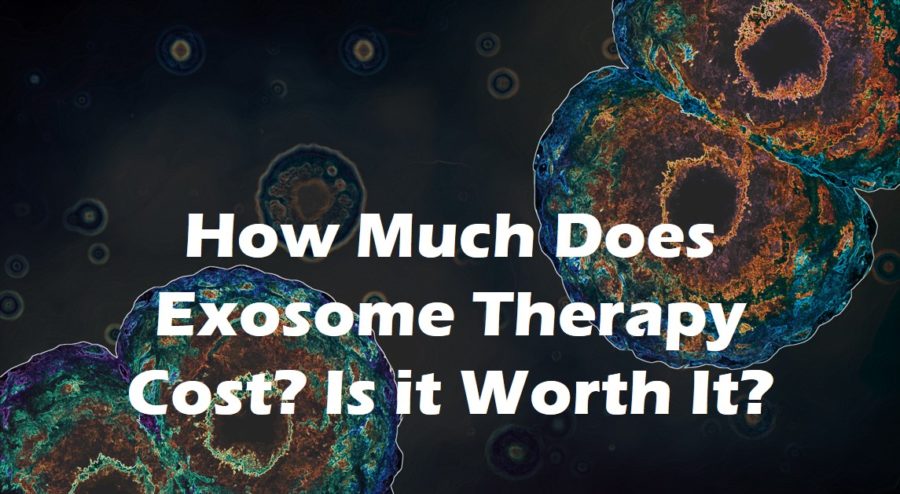Exosomes have been all the rage lately. However, we practice in a site in Grand Cayman that throws away trillions of exosomes each month. So how can I synch those two realities? To understand more, let’s review exosome therapy cost and review whether the treatment is worth it.
What are Exosomes?
Exosomes are how cells talk to each other (1). They are little packets of information that one cell excretes to communicate something to other cells. Every cell in your body produces exosomes and they’re found everywhere from your saliva to your urine.
If they’re found everywhere in my body already, why are doctors claiming that exosomes are the best thing since sliced bread? The idea is that by capturing and concentrating the exosomes produced by stem cells that are growing in culture, the exosomes can be used instead of the stem cells for tissue repair. To learn more, watch my short video below:
Is any of this true? Why do we throw away exosomes and use stem cells? Do really exosomes work? How much does exosome therapy cost? Let’s start with the last one and work backward.
How Much Does Exosome Therapy Cost?
After performing some research, the average exosome therapy cost is in the $5,000-$10,000 range. The therapy is often delivered intravenously (IV) and also frequently to the local site if the treatment is orthopedic focused. Meaning for knee arthritis treatment the patient will often get an IV plus a knee injection.
So why would we throw a ten thousand dollar treatment down the drain? Do exosomes work? Obviously, the answers to these two questions will get to whether the exosome therapy cost is worth it or whether the patient is just throwing their hard-earned money down the drain.
Do Exosomes Work?
At this point, we don’t have a single human study that shows that giving someone an IV infusion of exosomes or a local injection will help heal them or treat their disease. Hence, if the cost of treatment is directly related to the research that shows that it works, the real value of an exosome treatment is very little at this point.
Why are clinics using this therapy if there’s is no human research that shows it’s effective? Some doctors are hanging their hat on lab-based or animal studies. However, the products used in these studies are very different than what clinics can buy. In addition, the medical world is littered with drugs that seemed to work well in animals only to fail in humans.
Why do we throw away exosomes? At our licensed advanced stem cell treatment site in Grand Cayman, we grow a patient’s stem cells to greater numbers over a few weeks. While the stem cells are producing exosomes and we could easily concentrate and use those exosomes as part of the treatment, we don’t. Why? Remember that exosomes are merely what the stem cells are saying to other cells. They are therefore static messages that could mean anything from an order for another cell to repair damaged cells to the stem cell saying something that has nothing to do with tissue repair (2,3). The real intelligence for repair in this example is the stem cell. Only the stem cell has the smarts to be able to determine which messages to bark out and when.
Is Exosome Therapy Legal?
The FDA, in response to reported complications sustained by patients receiving exosome therapy, has declared that exosome products now require a full drug approval. None of the commercially available exosome products being used by clinics have that approval but instead are only registered as a tissue transplant product without FDA review prior to sale. Hence, the use of exosomes to treat a patient is now illegal per FDA regulations. See my video below for more information:
The upshot? The exosome therapy cost at this point clearly outweighs what we know about this treatment. Meaning, for a procedure to be worth thousands of dollars, we need to have research in real patients showing it works in at least some of those people. Regrettably, we don’t have that information on exosomes right now, so the therapy is more hype than reality.
_______________________________________
References:
(1) Vakhshiteh F, Atyabi F, Ostad SN. Mesenchymal stem cell exosomes: a two-edged sword in cancer therapy. Int J Nanomedicine. 2019;14:2847–2859. Published 2019 Apr 23. doi: 10.2147/IJN.S200036
(2) Yin K, Wang S, Zhao RC. Exosomes from mesenchymal stem/stromal cells: a new therapeutic paradigm. Biomark Res. 2019;7:8. Published 2019 Apr 4. doi: 10.1186/s40364-019-0159-x
(3) Kusuma GD, Carthew J, Lim R, Frith JE. Effect of the Microenvironment on Mesenchymal Stem Cell Paracrine Signaling: Opportunities to Engineer the Therapeutic Effect. Stem Cells Dev. 2017 May 1;26(9):617-631. doi: 10.1089/scd.2016.0349.
